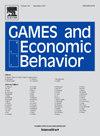后向诱导的高风险失败
IF 1
3区 经济学
Q3 ECONOMICS
引用次数: 0
摘要
我们利用 40 多年来美国电视游戏节目的数据,研究了高风险战略选择。在每期节目中,参赛者都要玩一个完全信息的连续游戏,通过逆向归纳法可以找到该游戏的最优策略。我们发现,参赛者会系统性地偏离子博弈完全纳什均衡。这些偏离最优状态的情况可以用允许有限预见的修正代理量子反应模型很好地解释。结果表明,许多参赛者通过采用近视表征来简化决策问题,只优化击败下一位参赛者的机会。与学习相一致的是,在我们的样本期内,参赛者的选择也在不断改进。本文章由计算机程序翻译,如有差异,请以英文原文为准。
High-stakes failures of backward induction
We examine high-stakes strategic choice using more than 40 years of data from the American TV game show . In every episode, contestants play the , a sequential game of perfect information for which the optimal strategy can be found through backward induction. We find that contestants systematically deviate from the subgame perfect Nash equilibrium. These departures from optimality are well explained by a modified agent quantal response model that allows for limited foresight. The results suggest that many contestants simplify the decision problem by adopting a myopic representation, and optimize their chances of beating the next contestant only. In line with learning, contestants' choices improve over the course of our sample period.
求助全文
通过发布文献求助,成功后即可免费获取论文全文。
去求助
来源期刊

Games and Economic Behavior
ECONOMICS-
CiteScore
1.90
自引率
9.10%
发文量
148
期刊介绍:
Games and Economic Behavior facilitates cross-fertilization between theories and applications of game theoretic reasoning. It consistently attracts the best quality and most creative papers in interdisciplinary studies within the social, biological, and mathematical sciences. Most readers recognize it as the leading journal in game theory. Research Areas Include: • Game theory • Economics • Political science • Biology • Computer science • Mathematics • Psychology
 求助内容:
求助内容: 应助结果提醒方式:
应助结果提醒方式:


